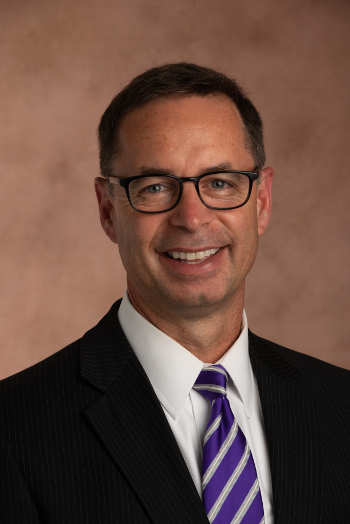
In many ways, being a leader has always come natural to Dr. Joseph Weistroffer.
It was that way for him as a Midshipman at the U.S. Naval Academy in Annapolis and during a semester at West Point. He relied on those leadership skills as a naval fighter pilot and they continue to serve him well today as a skilled spine surgeon and as Program Director of the medical school’s Orthopaedic Surgery Residency Program.
Now, Dr. Weistroffer is hard at work taking what he has learned and passing it along to medical students – the next generation of physicians – at WMed.
“I firmly believe that we need to teach physicians how to be leaders, as well as surgeons and clinicians,” Dr. Weistroffer said recently. “Healthcare today is a team-based field and to provide the best patient care, a physician has to make sure their team is taken care of and as effective as possible.
“We spend a lot of time teaching doctors how to evaluate, diagnose, and treat patients and it’s just now being recognized how important it is to teach them the other parts of being a good physician,” he added. “How to be a good leader, a good manager, how to run a practice or a hospital. There’s a lot more to it than just diagnosing and treating because medicine has become more complex.”
Dr. Weistroffer’s efforts are gaining attention and earlier this year he was named as a 2018 Alpha Omega Alpha Honor Medical Society Fellow in Leadership. Dr. Weistroffer was among three physician leaders who were chosen to participate in the one-year program.
The fellowship program, which is now in its fifth year, recognizes and supports the development of outstanding mid-career physician leaders who are members of the AOA. The fellowship is made up of five essential components, including self-examination and the “inward journey,” as well as a structured curriculum focusing on the topics related to leadership, experiential and team-based learning.
When he arrived at WMed in 2016, Dr. Weistroffer was presented with the opportunity to teach leadership to first-year medical students. Since that time, he has put in place a comprehensive leadership program that seeks to hone first-year students’ leadership skills.
As part of a project for his AOA fellowship, Dr. Weistroffer is working with David Wallace, PhD, at the U.S. Naval Academy on a project to gauge the efficacy of the leadership program at WMed. The project, he said, is examining how incoming student identify as leaders when they arrive at the medical school and whether the way they see themselves as a leader changes once they complete the curriculum.
“The hope is we can validate some of these measurements,” Dr. Weistroffer said. “Right now, no one knows if leadership education works and we think we may have found a way to measure it. This is a preliminary study to learn more and we’ve gotten interest from other institutions across the country.”
While his work on the fellowship project has been beneficial, Dr. Weistroffer said the program has also afforded him the opportunity to attend leadership courses with the American Academy of Medical Colleges (AAMC) while also developing important relationships with his mentors for the fellowship, Hal B. Jenson, MD, MBA, WMed’s founding dean, as well as Joshua D. Hartzell, MD, a lieutenant colonel in the U.S. Army and an associate professor and assistant dean for Faculty Development at the Uniformed Services University of the Health Sciences in Bethesda, Maryland; Eve J. Higginbotham, SM, MD, professor of Ophthalmology and vice dean for Diversion and Inclusion of the Perelman School of Medicine at the University of Pennsylvania, and Eric Schoomaker, MD, PhD, who formerly served as the U.S. Army Surgeon General and commanding general of the U.S. Army Medical Command and is now the director of the Uniformed Service University of the Health Sciences LEAD program.
He said he’s also forged valuable relationships with Terrance D. Peabody, MD, chair of the Department of Orthopaedic Surgery at the Northwestern University Feinberg School of Medicine, and Wiley “Chip” Souba, MD, MBA, ScD, professor of Surgery and emeritus dean at Dartmouth Geisel School of Medicine.
“These are absolutely amazing human beings,” he added. “They are all transformational leaders who have really done some wonderful things in medicine.”
Going forward, Dr. Weistroffer hopes to expand his efforts around leadership development into graduate medical education at WMed. He also plans to become more involved in leadership development on a national level with the AOA.
“It’s been an amazing journey already,” Dr. Weistroffer said of the fellowship, which began in July. “It’s been transformative for me and how I look at things as well as the scope of what I hope my life in medicine will be.”
